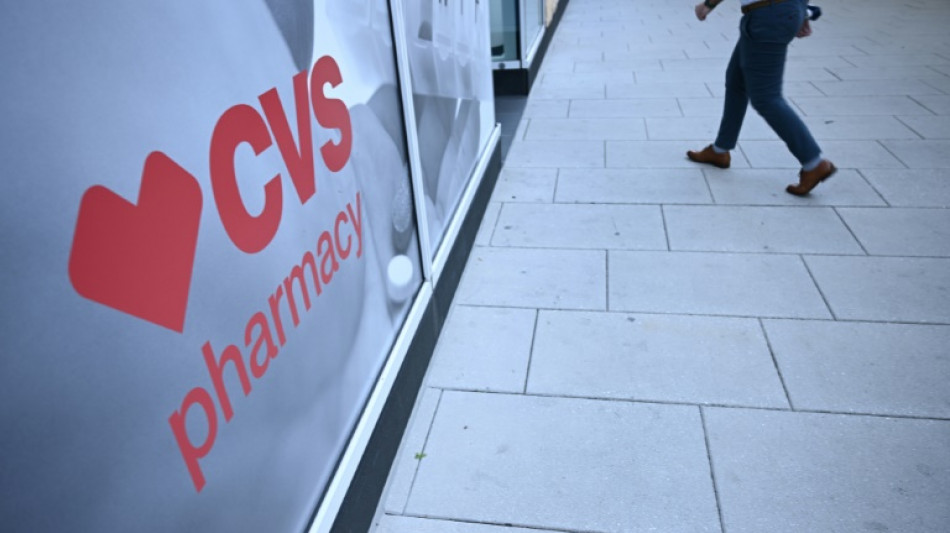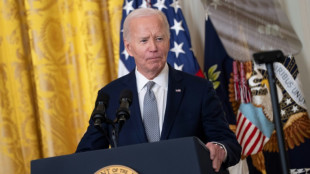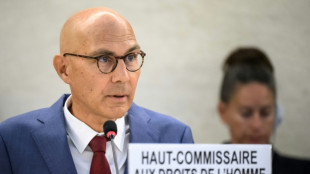
-
 Brazil says 2024 was its hottest year on record
Brazil says 2024 was its hottest year on record
-
Soldier in Vegas Tesla blast suffered PTSD, no 'terror' link: FBI

-
 Lake Placid chosen as Olympic venue super sub if gamble on Cortina backfires
Lake Placid chosen as Olympic venue super sub if gamble on Cortina backfires
-
'Luke the Nuke' still living his teenage darts dream

-
 MLB Dodgers agree to terms with South Korean infielder Kim
MLB Dodgers agree to terms with South Korean infielder Kim
-
Bellingham grabs Real Madrid late Valencia win after Vinicius red

-
 US Olympian Kerley facing charges after clash with Miami Beach police
US Olympian Kerley facing charges after clash with Miami Beach police
-
Teenage sensation Littler storms to world darts title

-
 Judge to sentence Trump before inauguration in hush money case
Judge to sentence Trump before inauguration in hush money case
-
Microsoft expects to spend $80 bn on AI this fiscal year

-
 AC Milan rally past Juventus to meet Inter in Italian SuperCup final
AC Milan rally past Juventus to meet Inter in Italian SuperCup final
-
Trump-backed Republican Johnson elected speaker of US House

-
 Gaza rescuers say about 30 killed as truce talks resume
Gaza rescuers say about 30 killed as truce talks resume
-
UK, Germany electricity cleanest on record in 2024

-
 Oil from Russian tanker spill reaches Sevastopol
Oil from Russian tanker spill reaches Sevastopol
-
Man arrested for supplying drugs to Liam Payne: Argentine police

-
 US House rejects Trump-backed speaker in first ballot
US House rejects Trump-backed speaker in first ballot
-
European ministers urge inclusive transition on Syria visit

-
 Rickelton hits Test best as South Africa on top against Pakistan
Rickelton hits Test best as South Africa on top against Pakistan
-
Lebanon minister says working to 'resolve' Syria's new entry restrictions

-
 US announces $306 mn in new bird flu funding
US announces $306 mn in new bird flu funding
-
Salah targets Premier League glory in 'last year' at Liverpool

-
 Rockets fired from Gaza as Israeli strikes kill 16, rescuers say
Rockets fired from Gaza as Israeli strikes kill 16, rescuers say
-
Marseille coach De Zerbi defends 'strong' Ligue 1

-
 Rickelton, Bavuma tons put South Africa in strong position
Rickelton, Bavuma tons put South Africa in strong position
-
Breeding success: London zoo counts its animals one-by-one

-
 Fofana could miss rest of Chelsea's season
Fofana could miss rest of Chelsea's season
-
Republican speaker, Trump face test in Congress leadership fight

-
 Man Utd 'starving for leaders' ahead of Liverpool clash: Amorim
Man Utd 'starving for leaders' ahead of Liverpool clash: Amorim
-
Alcohol should have cancer warning label: US surgeon general

-
 Biden blocks US Steel sale to Japan's Nippon Steel
Biden blocks US Steel sale to Japan's Nippon Steel
-
Wall Street stocks bounce higher, Europe retreats

-
 Neil Young says he will play Glastonbury after all
Neil Young says he will play Glastonbury after all
-
Frenchman Castera plots roadmap for Dakar success

-
 Doha hosts PSG clash with Monaco in French Champions Trophy
Doha hosts PSG clash with Monaco in French Champions Trophy
-
Hamilton 'excited for year ahead' after Ferrari switch

-
 Man City must 'think' about De Bruyne future: Guardiola
Man City must 'think' about De Bruyne future: Guardiola
-
Biden blocks US-Japan steel deal

-
 French police to face trial for 'suffocating' death
French police to face trial for 'suffocating' death
-
British novelist David Lodge dies aged 89

-
 Indonesia says 2024 was hottest year on record
Indonesia says 2024 was hottest year on record
-
South African Lategan wins Dakar Rally prologue

-
 Barca coach Flick optimistic but 'not happy' over Olmo situation
Barca coach Flick optimistic but 'not happy' over Olmo situation
-
Djokovic Australian Open preparations take hit with loss to Opelka

-
 Indian duo self-immolate in Bhopal waste protest
Indian duo self-immolate in Bhopal waste protest
-
Indian food delivery app rolls out ambulance service

-
 Arsenal must 'flip coin' in Premier League title race, says Arteta
Arsenal must 'flip coin' in Premier League title race, says Arteta
-
European stock markets retreat after positive start to year

-
 World food prices dip 2% in 2024: FAO
World food prices dip 2% in 2024: FAO
-
The horror of Saydnaya jail, symbol of Assad excesses


New US rule on abortion pills: What changes?
US public health officials this week authorized pharmacies to sell abortion pills by prescription. What exactly does that change for women in the United States, after several states banned abortion last year?
- Where were they sold before? -
A medication-induced abortion, also known as medical abortion, involves taking two different drugs over the course of one or two days.
The first (mifepristone) blocks the pregnancy, and the second (misoprostol) provokes bleeding to empty the uterus.
The biggest issues surround mifepristone, which has been authorized and tightly regulated by the US Food and Drug Administration (FDA) since 2000.
The FDA has approved mifepristone to be used through the 10th week of pregnancy.
Until shortly before the Covid pandemic, it could be provided only in person and in specific locales, notably abortion clinics.
But as a result of a lawsuit during the pandemic, the FDA agreed to temporarily allow the drug to be distributed by mail, following a consultation -- in person or remote -- with a doctor.
Then in December 2021, the FDA announced that it was permanently lifting the requirement for in-person delivery of mifepristone.
The agency asked the two pharmaceutical companies supplying it -- Danco Laboratories, which sells it as Mifeprex, and generic manufacturer GenBioPro -- to set up a system allowing wider distribution. That is what was approved this week.
- How does the new system work? -
Pharmacies wishing to sell mifepristone will have to sign a form to be returned to Danco and GenBioPro, guaranteeing that they will be able to dispense the pills to patients within a maximum of four days (if the drug is not stocked on site).
The pharmacy must also stipulate that the prescription comes from a certified medical professional (a doctor or, depending on the state, a nurse).
To be certified, caregivers must themselves fill out a form assuring that they have a relationship with a hospital or clinic that can provide urgent care if needed. They must also obtain a signed consent form from their patients.
Since the doctors themselves are no longer obligated to stock the pills, more might decide to get involved.
It is a "very decentralized system," Kirsten Moore, director of the Expanding Medication Abortion Access Project, told AFP. The FDA "doesn't get involved in the day-to-day management at all."
For Antonia Biggs, a researcher in reproductive health issues at the University of California, San Francisco, the various certifications are unnecessary, but the FDA decision represents "a huge step" -- "it brings medication abortion pills closer to people."
- How soon will pharmacies take part? -
That is unclear. "I would say that in the coming weeks and months, we'll be able to see some more providers" taking part in the program, Jenny Ma, senior counsel with the Center for Reproductive Rights, told AFP.
Two of the biggest US pharmacy chains, Walgreens and CVS, have said they want to participate in the states where it is possible.
- What impact in states where abortion is legal? -
Where abortion is legal, the new measure adds a third option for obtaining the pills, after abortion clinics and the mail. It could allow some women to abort sooner, without waiting for pills to arrive or having to travel to a clinic that may be far away.
"That's going to help tremendously people who live in rural communities," Ma said, particularly those "who might not be able to afford the travel costs."
It could also help women for whom receiving pills by mail might be uncomfortable or complicated, whether young people living with their parents, "people in violent relationships," or those without "stable housing," said Biggs.
Above all, Ma said, "it destigmatizes abortion care; it makes it more similar to any other comparable drug."
- How about states where abortion is illegal? -
A landmark ruling last summer by the US Supreme Court overturned the nationwide right to abortion, allowing each state to pass its own laws governing the procedure.
About a dozen states have since made abortion almost entirely illegal.
In those states, abortion pills remain illegal -- the FDA ruling changes nothing.
"What it will do is make the disparity (between states) even more stark," Ma said.
But women who decide to travel to a state where abortion is legal may now find a pharmacy much closer than an abortion clinic, thereby reducing, and simplifying, their travel.
P.Stevenson--AMWN

